冀教版 英语课件:九年级下unit5 culture shapes us lesson36
文档属性
| 名称 | 冀教版 英语课件:九年级下unit5 culture shapes us lesson36 | 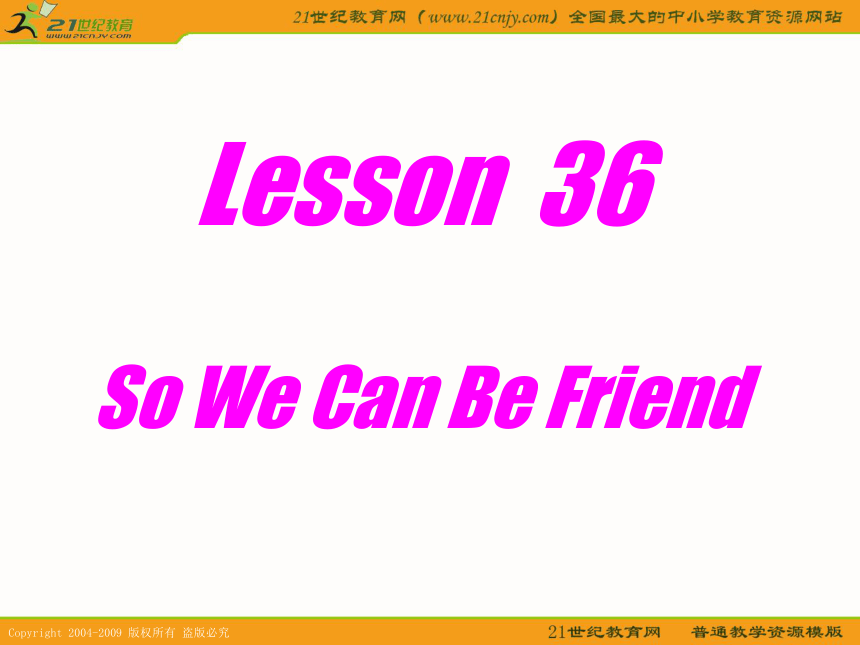 | |
| 格式 | rar | ||
| 文件大小 | 246.0KB | ||
| 资源类型 | 教案 | ||
| 版本资源 | 冀教版 | ||
| 科目 | 英语 | ||
| 更新时间 | 2010-08-23 18:40:00 | ||
图片预览

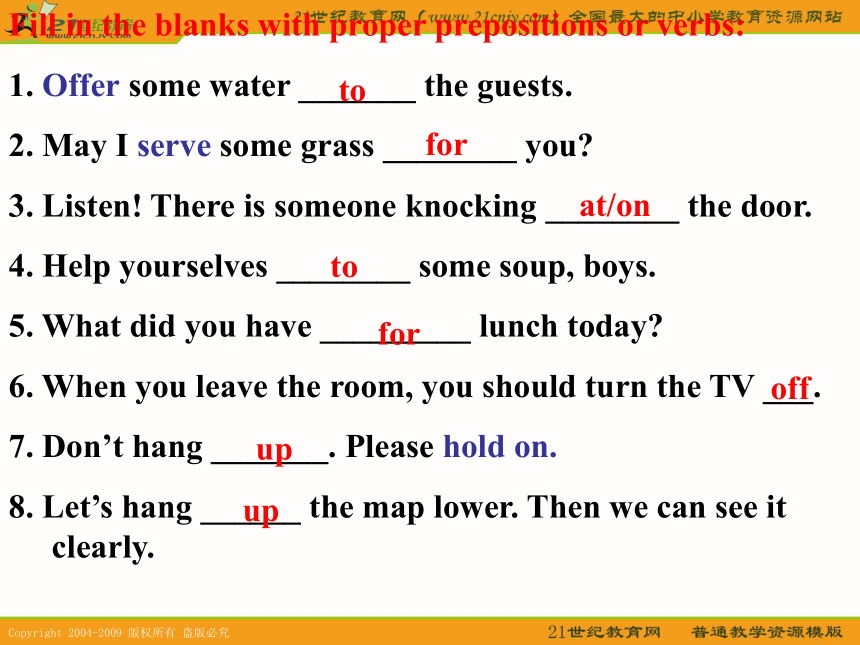
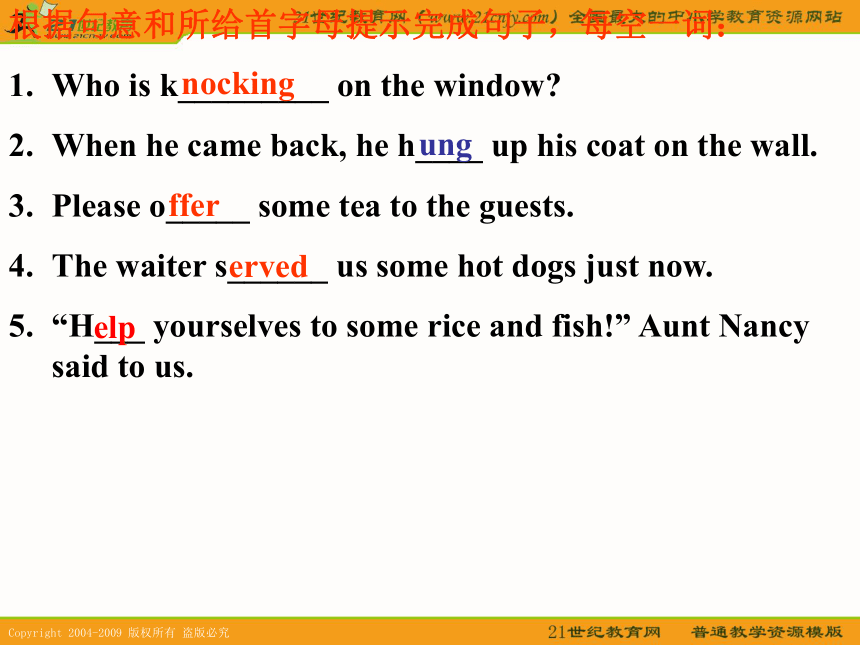
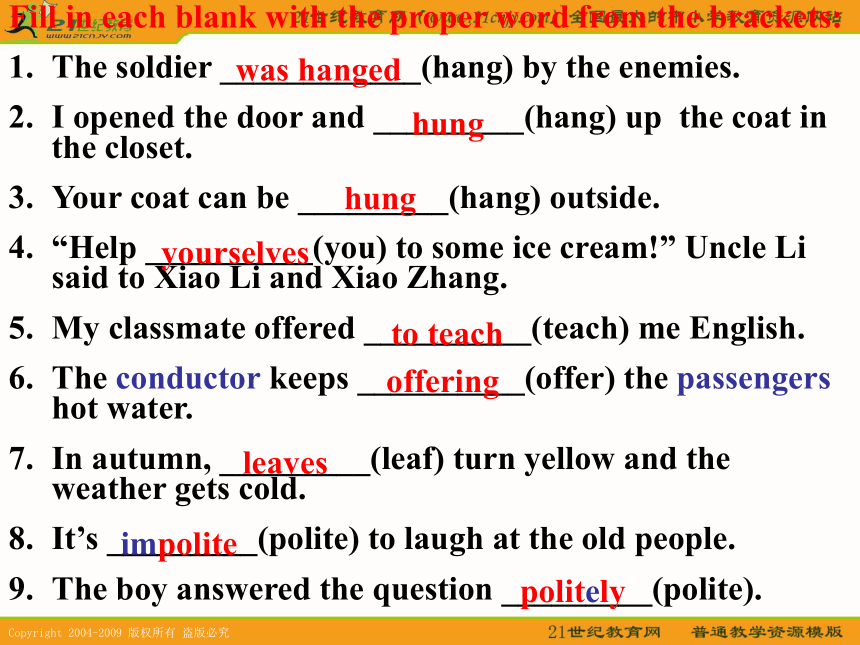
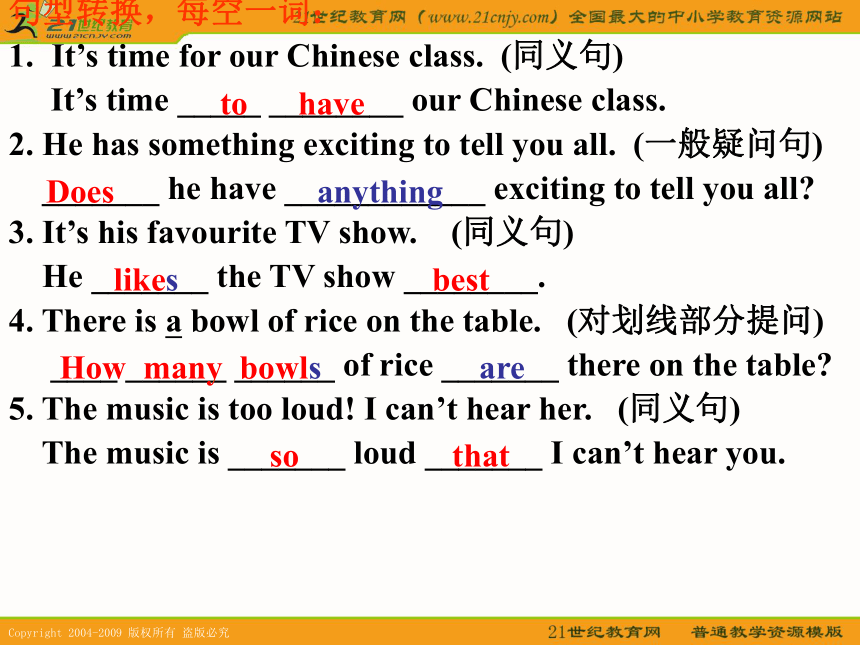
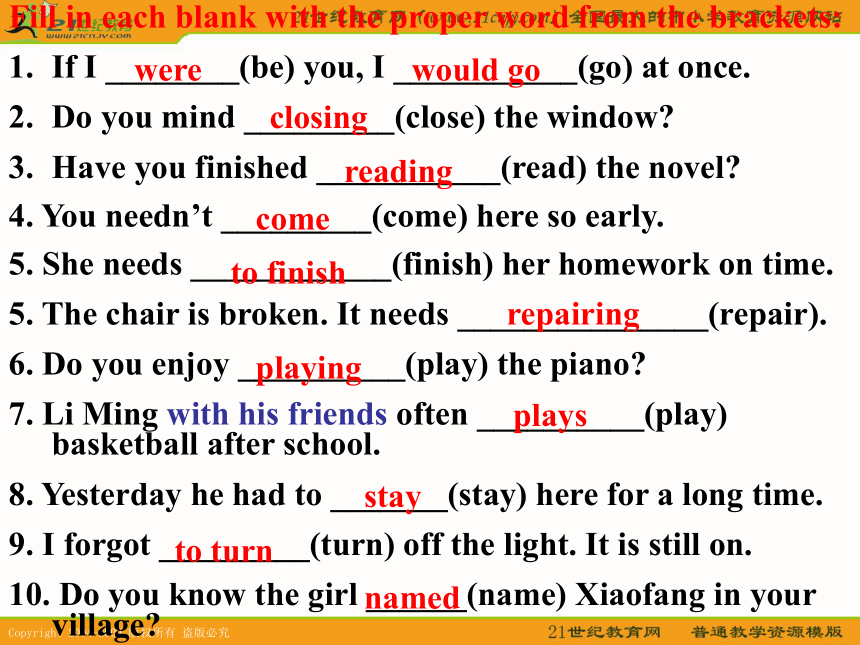
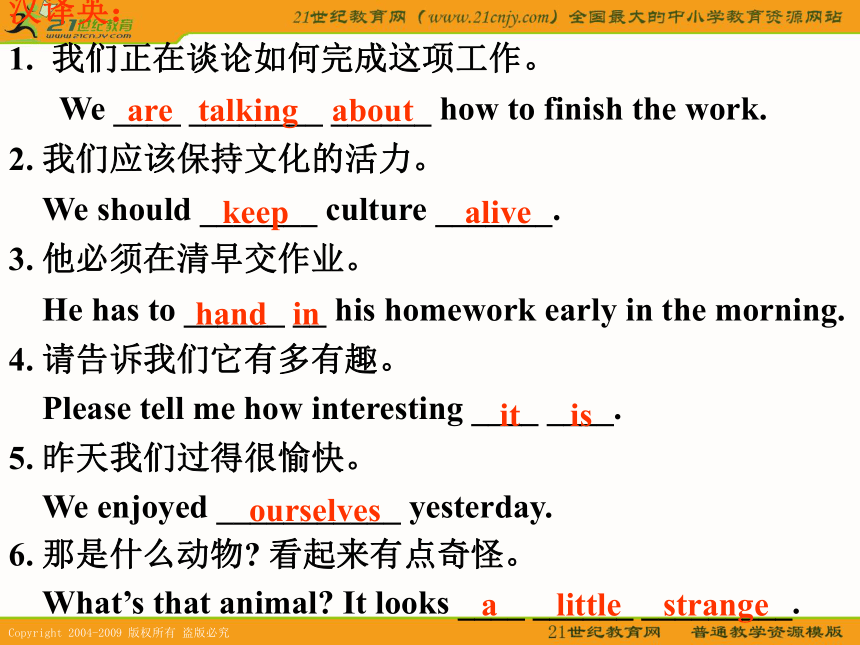
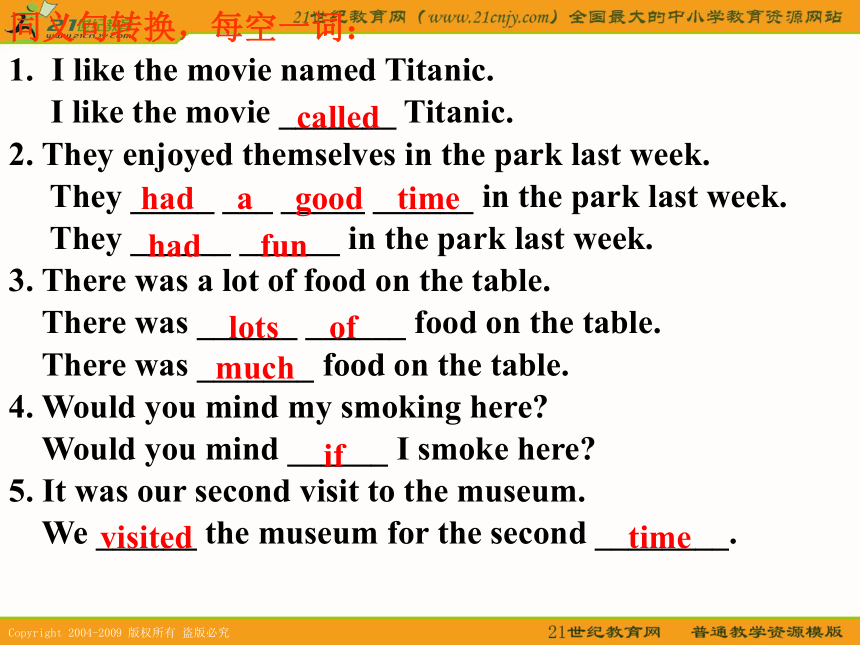
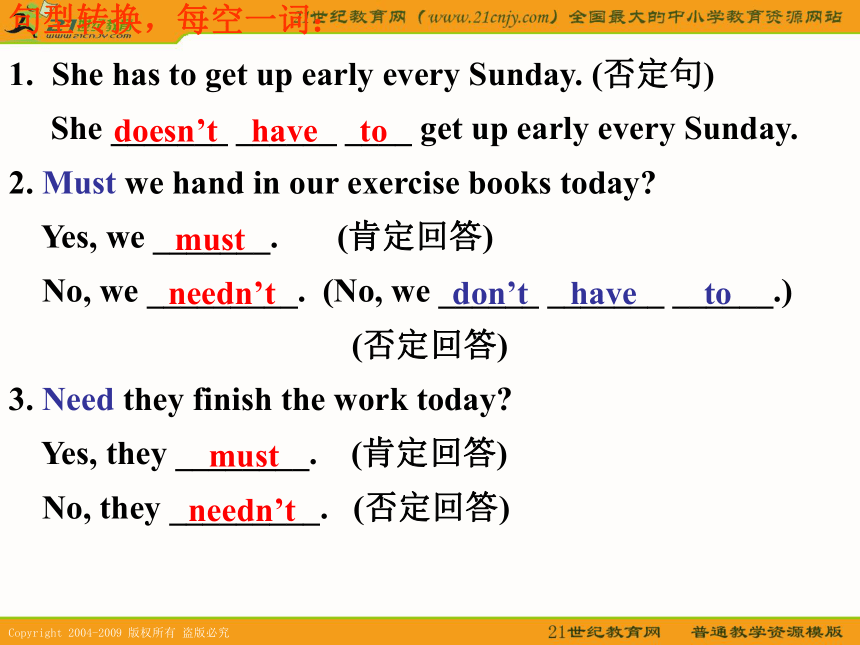
文档简介
课件26张PPT。
Lesson 36
So We Can Be Friend
Fill in the blanks with proper prepositions or verbs:
1. Offer some water _______ the guests.
2. May I serve some grass ________ you?
3. Listen! There is someone knocking ________ the door.
4. Help yourselves ________ some soup, boys.
5. What did you have _________ lunch today?
6. When you leave the room, you should turn the TV ___.
7. Don’t hang _______. Please hold on.
8. Let’s hang ______ the map lower. Then we can see it clearly.
to at/ontoforoffupupfor根据句意和所给首字母提示完成句子,每空一词:
Who is k_________ on the window?
When he came back, he h____ up his coat on the wall.
Please o_____ some tea to the guests.
The waiter s______ us some hot dogs just now.
“H___ yourselves to some rice and fish!” Aunt Nancy said to us.nockingung fferelpervedFill in each blank with the proper word from the brackets:
The soldier ____________(hang) by the enemies.
I opened the door and _________(hang) up the coat in the closet.
Your coat can be _________(hang) outside.
“Help __________(you) to some ice cream!” Uncle Li said to Xiao Li and Xiao Zhang.
My classmate offered __________(teach) me English.
The conductor keeps __________(offer) the passengers hot water.
In autumn, _________(leaf) turn yellow and the weather gets cold.
It’s _________(polite) to laugh at the old people.
The boy answered the question _________(polite).
was hangedhunghungyourselves offeringleavesto teachimpolitepolitely句型转换,每空一词:
It’s time for our Chinese class. (同义句)
It’s time _____ ________ our Chinese class.
2. He has something exciting to tell you all. (一般疑问句)
_______ he have ____________ exciting to tell you all?
3. It’s his favourite TV show. (同义句)
He _______ the TV show ________.
4. There is a bowl of rice on the table. (对划线部分提问)
____ ______ ______ of rice _______ there on the table?
5. The music is too loud! I can’t hear her. (同义句)
The music is _______ loud _______ I can’t hear you. to have DoesanythinglikesbestHow many bowlsaresothatFill in each blank with the proper word from the brackets:
If I ________(be) you, I ___________(go) at once.
Do you mind _________(close) the window?
Have you finished ___________(read) the novel?
4. You needn’t _________(come) here so early.
5. She needs ____________(finish) her homework on time.
5. The chair is broken. It needs _______________(repair).
6. Do you enjoy __________(play) the piano?
7. Li Ming with his friends often __________(play) basketball after school.
8. Yesterday he had to _______(stay) here for a long time.
9. I forgot _________(turn) off the light. It is still on.
10. Do you know the girl ______(name) Xiaofang in your village?
werewould goclosingreading to finishrepairingcomeplayingplaysstayto turnnamed汉译英:
我们正在谈论如何完成这项工作。
We ____ ________ ______ how to finish the work.
2. 我们应该保持文化的活力。
We should _______ culture _______.
3. 他必须在清早交作业。
He has to ______ __ his homework early in the morning.
4. 请告诉我们它有多有趣。
Please tell me how interesting ____ ____.
5. 昨天我们过得很愉快。
We enjoyed ___________ yesterday.
6. 那是什么动物? 看起来有点奇怪。
What’s that animal? It looks ____ ______ _________.are talking aboutkeep alivehand init isourselves a little strange同义句转换,每空一词:
I like the movie named Titanic.
I like the movie _______ Titanic.
2. They enjoyed themselves in the park last week.
They _____ ___ _____ ______ in the park last week.
They ______ ______ in the park last week.
3. There was a lot of food on the table.
There was ______ ______ food on the table.
There was _______ food on the table.
4. Would you mind my smoking here?
Would you mind ______ I smoke here?
5. It was our second visit to the museum.
We ______ the museum for the second ________.calledhad a good timehad funlots ofmuchifvisitedtime句型转换,每空一词:
She has to get up early every Sunday. (否定句)
She _______ ______ ____ get up early every Sunday.
2. Must we hand in our exercise books today?
Yes, we _______. (肯定回答)
No, we _________. (No, we ______ _______ ______.)
(否定回答)
3. Need they finish the work today?
Yes, they ________. (肯定回答)
No, they _________. (否定回答)
doesn’t have to mustneedn’tdon’t have tomustneedn’tA task:
Is “Chinatown” a “town”?
Who lives there?
What language do people living there speak?
In a group, try to imagine what a Chinatown in
North America looks like.Think about it!
1. Are guests important in our country?
2. How are guests treated(对待) in China?
3. What can we do to make our guests feel
comfortable?
Talk about the picture!
What can you see in the pictures?
Where are they from?
What’s the man in the second picture doing?
PeruScotlandplay the bagpipesbagpipesplay the bagpipesRead carefully and answer the following question:
How to treat our guests? welcome them to our home
offer them some dinner
offer them a bed to restLanguage notes:1. We welcome you to our home. welcome n. “欢迎” give sb. a warm welcome welcome v. “欢迎” welcomed welcomed
welcome sb. to some place
welcome sb. to do sth.
Welcome you back!
Welcome you to China!
We welcomed him to visit our school. welcome adj. “受欢迎的” a welcome friend
You are welcome. welcome int. “欢迎” Welcome, friends!
Welcome home!
Welcome to our school!
Welcome to Beijing!Language notes: would like sth. = want sth.
would like to do sth. = want to do sth.
would like sb. to do sth. = want sb. to do sth.2. We’d like to offer you some dinner. 我生日的时候想要辆自行车。
你想和我去购物吗?
他们想让你和他们一起去打篮球。 I would like a bike for my birthday. Would you like to go shopping with me? They’d like you to play basketball with them. would like 比want语气婉转 Language notes: offer v. “提供, 供给”
offer sb. sth. = offer sth. to sb. “给某人提供某物”
offer to do sth. “主动提出做某事” 他给了我一杯茶。
我主动提出帮妈妈做家务。 He offered me a cup of tea.=He offered a cup of tea to me. I offered to help my mother do housework.3. Then a bed to rest. Then a bed to rest. 不定式作目的状语Language notes:4. You may find that our home is different from yours. must “想必,一定” 用于肯定句中,表示推测。
may “也许,可能” 用于肯定句中,表示推测,语气弱。
can’t “不可能” 用于否定句中,表否定的推测。 be different from … “与……不同”
be the same as … “与……一样” My house is different from yours.
= My house is not the same as yours. 我的观点与你的不同.
澳大利亚的天气与中国的不太相同. My idea is different from yours. The weather in Australia is quite different from that in
China.Language notes:5. We try to keep our culture. We will try to win the game. If this key can’t open the door, why not try using another
one? try doing sth. “试着做某事”
try to do sth. “试图/努力/尽力做某事” 我们要尽力嬴得这场比赛。
如果这把钥匙打不开,为什么不试一试另一把呢? keep v. “保有,保留,养活” keep v. “使某人(某物)保持某种状态或地位”
keep + 宾语 + 宾补(adj./adv./现在分词/过去分词/介词
短语等) He likes to keep old pictures.
His job is to keep sheep on a farm.Language notes: it是宾语, strange是宾语补足语。宾语补足语用来说明宾
语的情况,如果没有宾语补足语,句子所表达的意思就
不清楚,不完整。宾语和宾语补足语一起称为复合宾语。 6. We don’t find it strange. 形容词、副词名、词介词短语现、现在分词、过去分
词、 不定式 等均可用作宾语补足语。 I think it useful to learn English well.
It made me remember my own visit to Canada.
They made him their team leader.
We work hard to keep their culture alive.
They see meat hanging in shop windows.
This week they asked us to play basketball together.
Let him in. Let him out.
Keep the book in the desk.
My bike is broken. I will have it repaired.Language notes: learn about/of … “了解到……的消息; 学习有关……内容” 7. I would like to learn about your ways. be from = come from “来自”8. This man is from Peru. He is/comes from Beijing.
Where are you from?= Where do you come from?9. These people are from Scotland. The man is playing the
bagpipes. play the piano play the violin
play the guitar play the flute
play the bagpipes 今天我们要学习怎样使用网络。 Today we will learn about how to use the Internet.根据汉语提示,用英语单词的适当形式填空:
Do you know the ____________(不同) between the two pictures?
People like to eat food in _____________(不同) ways.
Yesterday we _____________(欢迎) him to visit our factory at the gate.
We _________________(学习) about Chinese culture since we came here.
His bag is heavier than _________(她的).difference(s)differentwelcomedhershave learned/learnt汉译英:
请你随便吃些肉,Lily。
Please ______ ___________ ______ to some meat, Lily.
2. 你想再要一些茶吗?
Would you like ________ ________ _________?
3. 看那个男孩在吹风笛。
Look! That boy is ________ _____ __________.help yourself to some more teaplaying the bagpipes同义句转换,每空一词:
You may find that our home is different from yours.
You may find _____ _______ _________ from yours.
2. I find that he is a very good student.
I find _______ a very good student.
3. Where is she from?
Where ______ she _______ from?
4. What do you want to do?
What ______ you ________ to do?
5. The waiter offered me a cup of coffee.
The waiter offered a cup of coffee ______ _______.
6. I would like to learn about your ways.
I would like to learn ______ your ways.
7. His computer isn’t the same as mine.
His computer ______ __________ _________ mine.our home differenthimdoes comewould liketo meofis different from补全对话,每空一词:
A: ________ to our restaurant. This way, please.
B: _________.
A: Please sit down. What would you ______, sir?
B: _______ like a bowl _______ fired rice.
(After fifteen minutes, the waiter came again.)
A: Would you like some _______?
B: No, _________. I’m full. _______ is the money.
A: Thank you. Goodbye.WelcomeThankslikeI’dofmorethanksHereA task:
In both China and Canada, guests are important
people. We should always take care of them! Do we
take care of guests differently in China and Canada?
In a small groups, compare Canadian and Chinese
customs about guests. Choose one way that they are
different from each other.
Prepare two shorts plays that show this difference.
Show what would happen in Canada, then show
what would happen in China. Present your plays to
the class or to another group of classmates.
Lesson 36
So We Can Be Friend
Fill in the blanks with proper prepositions or verbs:
1. Offer some water _______ the guests.
2. May I serve some grass ________ you?
3. Listen! There is someone knocking ________ the door.
4. Help yourselves ________ some soup, boys.
5. What did you have _________ lunch today?
6. When you leave the room, you should turn the TV ___.
7. Don’t hang _______. Please hold on.
8. Let’s hang ______ the map lower. Then we can see it clearly.
to at/ontoforoffupupfor根据句意和所给首字母提示完成句子,每空一词:
Who is k_________ on the window?
When he came back, he h____ up his coat on the wall.
Please o_____ some tea to the guests.
The waiter s______ us some hot dogs just now.
“H___ yourselves to some rice and fish!” Aunt Nancy said to us.nockingung fferelpervedFill in each blank with the proper word from the brackets:
The soldier ____________(hang) by the enemies.
I opened the door and _________(hang) up the coat in the closet.
Your coat can be _________(hang) outside.
“Help __________(you) to some ice cream!” Uncle Li said to Xiao Li and Xiao Zhang.
My classmate offered __________(teach) me English.
The conductor keeps __________(offer) the passengers hot water.
In autumn, _________(leaf) turn yellow and the weather gets cold.
It’s _________(polite) to laugh at the old people.
The boy answered the question _________(polite).
was hangedhunghungyourselves offeringleavesto teachimpolitepolitely句型转换,每空一词:
It’s time for our Chinese class. (同义句)
It’s time _____ ________ our Chinese class.
2. He has something exciting to tell you all. (一般疑问句)
_______ he have ____________ exciting to tell you all?
3. It’s his favourite TV show. (同义句)
He _______ the TV show ________.
4. There is a bowl of rice on the table. (对划线部分提问)
____ ______ ______ of rice _______ there on the table?
5. The music is too loud! I can’t hear her. (同义句)
The music is _______ loud _______ I can’t hear you. to have DoesanythinglikesbestHow many bowlsaresothatFill in each blank with the proper word from the brackets:
If I ________(be) you, I ___________(go) at once.
Do you mind _________(close) the window?
Have you finished ___________(read) the novel?
4. You needn’t _________(come) here so early.
5. She needs ____________(finish) her homework on time.
5. The chair is broken. It needs _______________(repair).
6. Do you enjoy __________(play) the piano?
7. Li Ming with his friends often __________(play) basketball after school.
8. Yesterday he had to _______(stay) here for a long time.
9. I forgot _________(turn) off the light. It is still on.
10. Do you know the girl ______(name) Xiaofang in your village?
werewould goclosingreading to finishrepairingcomeplayingplaysstayto turnnamed汉译英:
我们正在谈论如何完成这项工作。
We ____ ________ ______ how to finish the work.
2. 我们应该保持文化的活力。
We should _______ culture _______.
3. 他必须在清早交作业。
He has to ______ __ his homework early in the morning.
4. 请告诉我们它有多有趣。
Please tell me how interesting ____ ____.
5. 昨天我们过得很愉快。
We enjoyed ___________ yesterday.
6. 那是什么动物? 看起来有点奇怪。
What’s that animal? It looks ____ ______ _________.are talking aboutkeep alivehand init isourselves a little strange同义句转换,每空一词:
I like the movie named Titanic.
I like the movie _______ Titanic.
2. They enjoyed themselves in the park last week.
They _____ ___ _____ ______ in the park last week.
They ______ ______ in the park last week.
3. There was a lot of food on the table.
There was ______ ______ food on the table.
There was _______ food on the table.
4. Would you mind my smoking here?
Would you mind ______ I smoke here?
5. It was our second visit to the museum.
We ______ the museum for the second ________.calledhad a good timehad funlots ofmuchifvisitedtime句型转换,每空一词:
She has to get up early every Sunday. (否定句)
She _______ ______ ____ get up early every Sunday.
2. Must we hand in our exercise books today?
Yes, we _______. (肯定回答)
No, we _________. (No, we ______ _______ ______.)
(否定回答)
3. Need they finish the work today?
Yes, they ________. (肯定回答)
No, they _________. (否定回答)
doesn’t have to mustneedn’tdon’t have tomustneedn’tA task:
Is “Chinatown” a “town”?
Who lives there?
What language do people living there speak?
In a group, try to imagine what a Chinatown in
North America looks like.Think about it!
1. Are guests important in our country?
2. How are guests treated(对待) in China?
3. What can we do to make our guests feel
comfortable?
Talk about the picture!
What can you see in the pictures?
Where are they from?
What’s the man in the second picture doing?
PeruScotlandplay the bagpipesbagpipesplay the bagpipesRead carefully and answer the following question:
How to treat our guests? welcome them to our home
offer them some dinner
offer them a bed to restLanguage notes:1. We welcome you to our home. welcome n. “欢迎” give sb. a warm welcome welcome v. “欢迎” welcomed welcomed
welcome sb. to some place
welcome sb. to do sth.
Welcome you back!
Welcome you to China!
We welcomed him to visit our school. welcome adj. “受欢迎的” a welcome friend
You are welcome. welcome int. “欢迎” Welcome, friends!
Welcome home!
Welcome to our school!
Welcome to Beijing!Language notes: would like sth. = want sth.
would like to do sth. = want to do sth.
would like sb. to do sth. = want sb. to do sth.2. We’d like to offer you some dinner. 我生日的时候想要辆自行车。
你想和我去购物吗?
他们想让你和他们一起去打篮球。 I would like a bike for my birthday. Would you like to go shopping with me? They’d like you to play basketball with them. would like 比want语气婉转 Language notes: offer v. “提供, 供给”
offer sb. sth. = offer sth. to sb. “给某人提供某物”
offer to do sth. “主动提出做某事” 他给了我一杯茶。
我主动提出帮妈妈做家务。 He offered me a cup of tea.=He offered a cup of tea to me. I offered to help my mother do housework.3. Then a bed to rest. Then a bed to rest. 不定式作目的状语Language notes:4. You may find that our home is different from yours. must “想必,一定” 用于肯定句中,表示推测。
may “也许,可能” 用于肯定句中,表示推测,语气弱。
can’t “不可能” 用于否定句中,表否定的推测。 be different from … “与……不同”
be the same as … “与……一样” My house is different from yours.
= My house is not the same as yours. 我的观点与你的不同.
澳大利亚的天气与中国的不太相同. My idea is different from yours. The weather in Australia is quite different from that in
China.Language notes:5. We try to keep our culture. We will try to win the game. If this key can’t open the door, why not try using another
one? try doing sth. “试着做某事”
try to do sth. “试图/努力/尽力做某事” 我们要尽力嬴得这场比赛。
如果这把钥匙打不开,为什么不试一试另一把呢? keep v. “保有,保留,养活” keep v. “使某人(某物)保持某种状态或地位”
keep + 宾语 + 宾补(adj./adv./现在分词/过去分词/介词
短语等) He likes to keep old pictures.
His job is to keep sheep on a farm.Language notes: it是宾语, strange是宾语补足语。宾语补足语用来说明宾
语的情况,如果没有宾语补足语,句子所表达的意思就
不清楚,不完整。宾语和宾语补足语一起称为复合宾语。 6. We don’t find it strange. 形容词、副词名、词介词短语现、现在分词、过去分
词、 不定式 等均可用作宾语补足语。 I think it useful to learn English well.
It made me remember my own visit to Canada.
They made him their team leader.
We work hard to keep their culture alive.
They see meat hanging in shop windows.
This week they asked us to play basketball together.
Let him in. Let him out.
Keep the book in the desk.
My bike is broken. I will have it repaired.Language notes: learn about/of … “了解到……的消息; 学习有关……内容” 7. I would like to learn about your ways. be from = come from “来自”8. This man is from Peru. He is/comes from Beijing.
Where are you from?= Where do you come from?9. These people are from Scotland. The man is playing the
bagpipes. play the piano play the violin
play the guitar play the flute
play the bagpipes 今天我们要学习怎样使用网络。 Today we will learn about how to use the Internet.根据汉语提示,用英语单词的适当形式填空:
Do you know the ____________(不同) between the two pictures?
People like to eat food in _____________(不同) ways.
Yesterday we _____________(欢迎) him to visit our factory at the gate.
We _________________(学习) about Chinese culture since we came here.
His bag is heavier than _________(她的).difference(s)differentwelcomedhershave learned/learnt汉译英:
请你随便吃些肉,Lily。
Please ______ ___________ ______ to some meat, Lily.
2. 你想再要一些茶吗?
Would you like ________ ________ _________?
3. 看那个男孩在吹风笛。
Look! That boy is ________ _____ __________.help yourself to some more teaplaying the bagpipes同义句转换,每空一词:
You may find that our home is different from yours.
You may find _____ _______ _________ from yours.
2. I find that he is a very good student.
I find _______ a very good student.
3. Where is she from?
Where ______ she _______ from?
4. What do you want to do?
What ______ you ________ to do?
5. The waiter offered me a cup of coffee.
The waiter offered a cup of coffee ______ _______.
6. I would like to learn about your ways.
I would like to learn ______ your ways.
7. His computer isn’t the same as mine.
His computer ______ __________ _________ mine.our home differenthimdoes comewould liketo meofis different from补全对话,每空一词:
A: ________ to our restaurant. This way, please.
B: _________.
A: Please sit down. What would you ______, sir?
B: _______ like a bowl _______ fired rice.
(After fifteen minutes, the waiter came again.)
A: Would you like some _______?
B: No, _________. I’m full. _______ is the money.
A: Thank you. Goodbye.WelcomeThankslikeI’dofmorethanksHereA task:
In both China and Canada, guests are important
people. We should always take care of them! Do we
take care of guests differently in China and Canada?
In a small groups, compare Canadian and Chinese
customs about guests. Choose one way that they are
different from each other.
Prepare two shorts plays that show this difference.
Show what would happen in Canada, then show
what would happen in China. Present your plays to
the class or to another group of classmates.
同课章节目录
- Unit 7 Work for Peace
- Lesson 37 Don't Fight!
- Lesson 38 Making School a Better Place
- Lesson 39 The Dove and the Olive Branch
- Lesson 40 The UN—Power of Words
- Lesson 41 Jenny's Good Advice
- Lesson 42 Peace at Last
- Unit Review
- Unit 8 Culture Shapes Us
- Lesson 43 A Visit to Chinatown
- Lesson 44 Popular Sayings
- Lesson 45 Different Manners
- Lesson 46 Home to Many Cultures
- Lesson 47 Good Manners
- Lesson 48 Supper with the Bradshaws
- Unit Review
- Unit 9 Communication
- Lesson 49 Get Along with Others
- Lesson 50 Tips for Good Communication
- Lesson 51 What Could Be Wrong?
- Lesson 52 The Power of a Smile
- Lesson 53 Working in Groups
- Lesson 54 How Embarrassing!
- Unit Review
- Unit 10 Get Ready for the Future
- Lesson 55 Look into the Future
- Lesson 56 Manage Your Time
- Lesson 57 Best Wishes
- Lesson 58 Ms.Liu's Speech
- Lesson 59 Keep Your Choices Open
- Lesson 60 Get a Good Education
- Unit Review
